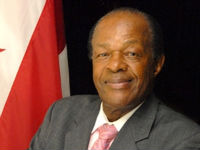D.C. marriage bill heads for Congress

Marion Barry (Photo: Courtesy D.C. Council)
Though it was long-expected, the D.C. Council’s vote Tuesday to give final approval to a marriage equality law for Washington, D.C., came as a large relief to many LGBT civil rights supporters.
The 11 to 2 vote came on the heels to two recent, stinging losses –the New York Senate rejection of a marriage equality bill there, and the November 3 ballot loss in Maine of a measure approved by the legislature earlier in the year.
The chamber erupted with applause and cheers as the vote was announced at 2:35 Tuesday afternoon.
But the vote Tuesday is not the final hurdle for marriage equality in Washington, D.C. While Democratic Mayor Adrian Fenty is expected to sign the bill as soon as possible, the District of Columbia is a federal territory, and, therefore, Congress has authority over its laws. Congress has 30 in-session days to take action to overturn the measure. And, according to the Washington Post, Robert Kabel, the openly gay chairman of the D.C. Republican Committee, is trying to convince Republicans in Congress not to attack the new D.C. marriage law.
Also working in the bill’s favor is the 30-day clock running down during a time when the Senate is fiercely occupied with health care reform, and that both the Senate and the House would have to vote to overturn the measure.
Those odds are apparently not stopping a group of clergy who oppose the bill. They vow to continue their opposition both in Congress and in the courts. With the help of the Alliance Defense Fund, a right-wing legal group that has filed many challenges against equal rights for gays, the clergymen are still pressing forward with an effort to put the issue before voters in the District.
But if there was any surprise with today’s vote, it was from the tenor of discussion in the Council chambers. One month earlier, the Council had entertained two public hearings at which hundreds of District residents gave testimony –much of it marked with harsh and hostile words about LGBT people and gay marriage.
That rancor was gone during Tuesday’s vote.
Before casting his vote in favor of the legislation, which he sponsored, openly gay Councilman David Catania thanked the council leadership for their help. And he acknowledged the long-time support of the LGBT community of the two councilmembers who voted against the bill. Catania singled out Councilmember Marion Barry in particular, noting that, although Barry was voting against the marriage equality bill, he had a long record of supporting the LGBT community which should not be forgotten.
Barry seemed genuinely touched by Catania’s remarks, and his response seemed to change the tenor of the political fight over the contentious issue. Barry recalled that, 38 years ago, when he was president of the D.C. school board, the superintendant of schools wanted to fire a gay teacher.
“I said, ‘No way’,” recalled Barry. Barry also acknowledged that he had sided with the LGBT community in the 1970s when few politicians would and that the LGBT community had been a large part of his first election as mayor in 1979.
“I stood up when it wasn’t popular,” said Barry, “…and it bothers me when I am castigated for my dissent” on the marriage equality issue.
“I’m not voting no against the GLBT community,” said Barry. “I’m voting No against this particular action.”
“I still stand with this community,” he added. “After this vote is over, I’m going to still stand with this community.”
The bill’s other opponent, Yvette Alexander, said she, too, was appreciative of the LGBT community’s respect and support despite her decision to vote against the measure.
Council judiciary committee chairman Phil Mendelson said the vote marks the “final step in this long march” toward equality. He noted that, while four states – Connecticut, Iowa, New Hampshire, and Vermont—approved marriage equality laws in just over a year, the District first approved domestic partnership benefits in 1992 –17 years ago. Others, including openly gay Councilmember Jim Graham noted that sodomy was still illegal in the District just 20 years ago.
Human Rights Campaign President Joe Solmonese issued a statement following the vote, saying “Today’s vote is a victory for all D.C. residents, whose relationships will soon be treated equally and fairly in the eyes of the law.”


Leave a Reply